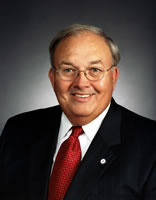In order to provide equal access and equal opportunity to people with diverse abilities, this site has been designed with accessibility in mind. Click here to view
Lerblance Reminds Citizens that November is National Alzheimer's Disease Awareness Month
 Senator Richard Lerblance
Senator Richard Lerblance
Senator Richard Lerblance knows all too well the devastating affects - physically, mentally and financially - that Alzheimer's can have on a family. His mother began showing symptoms of the disease in 1991 and has been totally incapacitated the past six years. For this reason, Lerblance wants to help bring awareness to this horrible disease and the fact that November is National Alzheimer's Disease Awareness Month.
"In my mind, it is one of the worst diseases because people lose their memories and essentially their entire existence. They don't know who they are and they don't know who you or anyone else is. They're just there," said Lerblance, D-Hartshorne. "It's the hardest thing to watch someone you love be in a constant state of confusion and irritation, or in my mother's case total incoherence, and you can't do anything for them. They just fade away."
Alzheimer’s disease is a progressive brain disorder that gradually destroys a person’s memory and ability to learn, reason, make judgments, communicate and carry out daily activities. There are currently around 4.5 million Americans age 65 and older with Alzheimer’s and as baby boomers age, the number of Americans with the disease will continue to grow to as many as 16 million in 2050. As of 2000, there were approximately 62,000 Oklahomans with the disease and that number is expected to jump 55 percent by 2025 to 96,000.
Despite these findings, Congress proposed a federal budget this year that would cut the appropriation for research through the National Institutes of Health. The proposed budget would have reduced research back to the pre-2004 level, although the national Alzheimer’s Association says $1 billion a year is needed for research. The budget proposal would have also cut four vital Alzheimer’s programs, one of which is called “Safe Return” which protects and returns patients home safely if they wander off.
“With new technology allowing us to detect Alzheimer’s in its earlier stages we’re redefining the face of the disease,” said Bill Thies, vice president, medical and scientific affairs, the Alzheimer’s Association. “Alzheimer’s is not a normal part of aging, nor is it a disease confined to the elderly. It is important to educate people as to the warning signs of the disease as well as fund continued research as an earlier diagnosis provides us a better understanding of the disease and allows us more time to treat it.”
If the disease is not checked, Medicare costs related to it will double to $50 billion within ten years according to the Alzheimer‘s Association, while Medicaid costs are estimated to increase 80 percent to $33 billion.
For this reason, Lerblance authored Senate Resolution 90 during the 2006 legislative session urging Congress not to cut research funding for the disease.
“Alzheimer’s research has the potential to save millions of lives, billions of dollars, and untold family grief. It’s an investment that we can’t turn our backs on,” said Lerblance. “It’s an investment in the health of our citizens and our future; and to me there is nothing more important.”
 Oklahoma Senate
Oklahoma Senate

